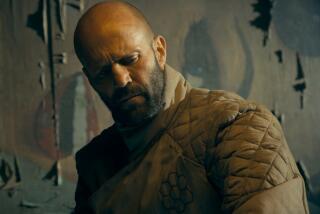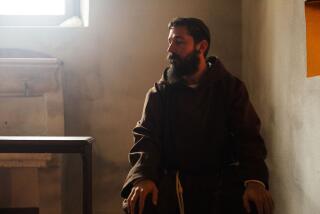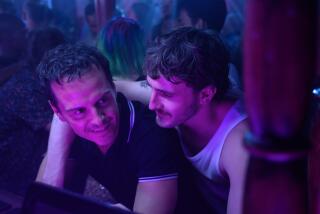Review: Shia LaBeouf bares a tortured soul in autobiographical ‘Honey Boy’
The searching that sprang from a court-appointed stint in rehab haunts every frame of “Honey Boy,” a dreamlike autobiographical exorcism written by self-styled enfant terrible Shia LaBeouf — and finessed with director Alma Har’el into a film starring LaBeouf — of the actor’s childhood as the son of an addict and the toxic cycles that ensued.
The result is at once a touching requiem and a work of forgiveness, both for a flawed father struggling with his demons all those years ago and the grown son who now peers into the mirror. Buoyed by sensitive and ferocious ensemble turns, “Honey Boy” is a cinematic salve for a tortured soul, in many regards a powerful vehicle for its star-screenwriter-subject and a vibrant narrative debut for documentary and video artist Har’el.
LaBeouf jumps into a role many would run screaming from: He turns into his own dad. Under sideburns, a receding mullet and a hard-lived paunch, quixotic charm dripping from his Southern-tinged twang, he slips into the skin of James Lort, the mercurial ex-con father and guardian to precocious kid actor Otis Lort — a fictionalized version of the younger LaBeouf, portrayed as a budding 12-year-old TV star by Noah Jupe (“A Quiet Place”).
But it’s Lucas Hedges, who plays Otis at the much angrier age of 22, that we meet first. The reedy and redheaded rising actor Oscar-nominated for “Manchester by the Sea” looks nothing like LaBeouf yet nails his mannerisms, his voice, his physicality and restless energy. The likeness of spirit is uncanny as the film opens on the adult Otis, a young Hollywood star at work on the set of an action megamovie, where stunt wires hurtle him backward as he shouts scripted screams of protest, take after take.
Otis has been so strapped in and yanked around his whole life that it’s subconscious relief to drown himself in alcohol later, alone in his trailer. Some monsters are even harder to fight than giant space robots. Drink, rage, repeat.
While his life might seem a picture of Hollywood success, Otis is clearly careening out of control. In a cannily edited opening montage, Har’el and editors Dominic LaPerriere and Monica Salazar cover in shorthand what you may or may not already know about the real LaBeouf: The “Transformers” blockbusters, the indie dramas, and the tabloid-fodder arrests that earned him an unenviable brand of Hollywood infamy, undermining what career strides he was making.
Premiering his personal pseudo-memoir “Honey Boy” to a standing ovation Friday at the Sundance Film Festival, Shia LaBeouf took the stage to cheers from the audience, revealing that the project began as part of his therapy while in rehab.
After a late-night crash in which he flips his car and, later, a profanity-laced drunken arrest that lands him in rehab (both modeled after LaBeouf’s real-life brushes with the law), “Honey Boy” unfolds as Otis begrudgingly moves into a group facility where he rejects the niceties of his roommate Percy (comedian-turned-actor Byron Bowers) and antagonizes the staff (including a scene-stealing Martin Starr).
Otis is a smart young man stuck in a cycle of self-destruction, and while he knows it, he doesn’t know why. “I’m an egomaniac with an inferiority complex,” he snipes at his therapist, Dr. Moreno (Laura San Giacomo), bouncing off the walls with feral frustration. “I’m a professional schizophrenic,” he says of his chosen vocation, to which fellow actors might say: Touché.
Informed that he’s showing signs of post-traumatic stress disorder, he instinctively denies the possibility: “From what?” he hisses.

“Honey Boy” official trailer
Crashing between time lines and dream sequences as the older Otis revisits his past, “Honey Boy” becomes an impressionistic collage of memories filmed in naturalistic observation by cinematographer Natasha Braier. The deeper Otis claws into his walled-off pain, the closer he gets to reckoning with his father and the long, toxic shadow the man cast over his adult life.
Flashing to the year 1995, we meet Jupe’s Otis as he’s taking a pie in the face on the set of a TV sitcom (the cable series “Even Stevens” made LaBeouf a breakout teen star). The family breadwinner at the age of 12, young Otis puts his natural talents to use as a child actor and stockpiles craft services snacks and per diems for when he goes home at night — if “home” is the right word for the rundown San Fernando Valley motel room he shares with his father, James, whom he pays to be his on-set chaperone.
There’s love but scant tenderness in life with James, a veteran, addict and onetime rodeo clown who runs lines with Otis and imparts his gifts of imagination and whimsy but constantly undercuts and belittles him, too. Jealous of his son’s success, in which he can only see his own failures, James is controlling at his best and emotionally and physically abusive at his worst.
It’s an enormous credit to LaBeouf and Jupe, who was just shy of 13 when “Honey Boy” began filming, that the alchemy of their scenes together come so marvelously and achingly alive in a coming-of-age tale that feels fairly familiar in its emotional goals.
Jupe matches LaBeouf pound for pound as Otis tries desperately to nurture his father into the kind of dad he will never become. Har’el confidently rests the heart of “Honey Boy” on the shoulders of her youngest star, and he rises to the task. But the film doesn’t let Otis walk alone.
As in her 2011 film “Bombay Beach,” an intimate documentary about people living on the margins in the Salton Sea, the director finds love and humanity in what some might see as a hopeless place. She creates fleeting moments of compassion even while skirting clichés as LaBeouf’s script gives Otis allies including Big Brother mentor Tom (Clifton Collins Jr.), whom a threatened James resents, and Shy Girl (singer FKA Twigs), the teenage prostitute and kindred spirit who lets Otis rest his troubles on her bosom.
It’s comforting that “Honey Boy” keeps its young charge company even when no one else is paying attention, and it’s somewhat startling that Jupe delivers the film’s most genuine and layered performance. That work is highlighted by a tense scene in which he relays barbed messages between his father and estranged mother over the phone, and another in which he subtly mimics his dad, bumming a cigarette and raising his voice in an attempt to speak James’s own broken love language.
LaBeouf, meanwhile, makes the humanity of his father impossible to ignore — a feat made more heartbreaking by the fact that you can never not see LaBeouf under all that James. Embracing its twee touches, including a tinkling playful score by Alex Somers, the film finds its way into an eerie, magical fantasy space that blurs the line between fact and fiction.
For the real LaBeouf and those who might sees themselves in his struggle — including Har’el, whose approach was informed by her own experience as a child of an addict — one hopes “Honey Boy” sparks healing. But for those who have watched the actor’s career closely, it also leaves conspicuous gaps curiously unanswered.
Can we find confidence in a narrative of LaBeouf’s own telling, for example, that leaves out his more confrontational works of performance art like #ALLMYMOVIES, in which he gauged how strangers watched him watching his own movies, or the racially charged part of the rant that accompanied the 2017 arrest that sent him to rehab?
What would the preening (and some might say, hilariously accurate) online film critic protagonist of his 2013 short film “HowardCantour.com” — a project he got dinged for plagiarizing from graphic novelist Dan Clowes — make of “Honey Boy”?

Director Alma Ha’rel and cast members Noah Jupe, Martin Starr, Clifton Collins and Byron Bowers stop by the L.A. Times Studio to discuss the “responsibility” of acting out Shia LaBeouf’s script.
Yet anchored as it is so specifically to LaBeouf and his journey in therapy, “Honey Boy” is holistically an expression of Har’el’s directorial vision and their artistic collaborations. It feels instantly of a piece with her body of work, sharing DNA with her 2016 docufiction “LoveTrue,” a three-stranded exploration of love financed and executive produced by LaBeouf, and her music video for Sigur Ros’ “Fjögur píanó” which featured the actor in a narrative about cyclical love and abuse.
For Har’el, “Honey Boy” announces a promising entrée into fiction filmmaking that dovetails with the more experimental directions she brought to previous visual forms. The empathy she brings to the film and its difficult subject emanates from the screen, and how she may yet push boundaries going forward feels like an exciting prospect.
For LaBeouf, “Honey Boy” may well be an act of catharsis, understanding and accountability; whether or not it truly serves those roles, only he will know. And should it matter to the rest of us? In Har’el’s hands that vision becomes at once confessional and curative, much bigger than one actor, one man or one boy’s story alone.
‘Honey Boy’
Rated: R, for pervasive language, some sexual material and drug use
Running time: 1 hour, 35 minutes
Playing: Starts Nov. 8, Arclight Hollywood; The Landmark, West Los Angeles
More to Read
Only good movies
Get the Indie Focus newsletter, Mark Olsen's weekly guide to the world of cinema.
You may occasionally receive promotional content from the Los Angeles Times.







